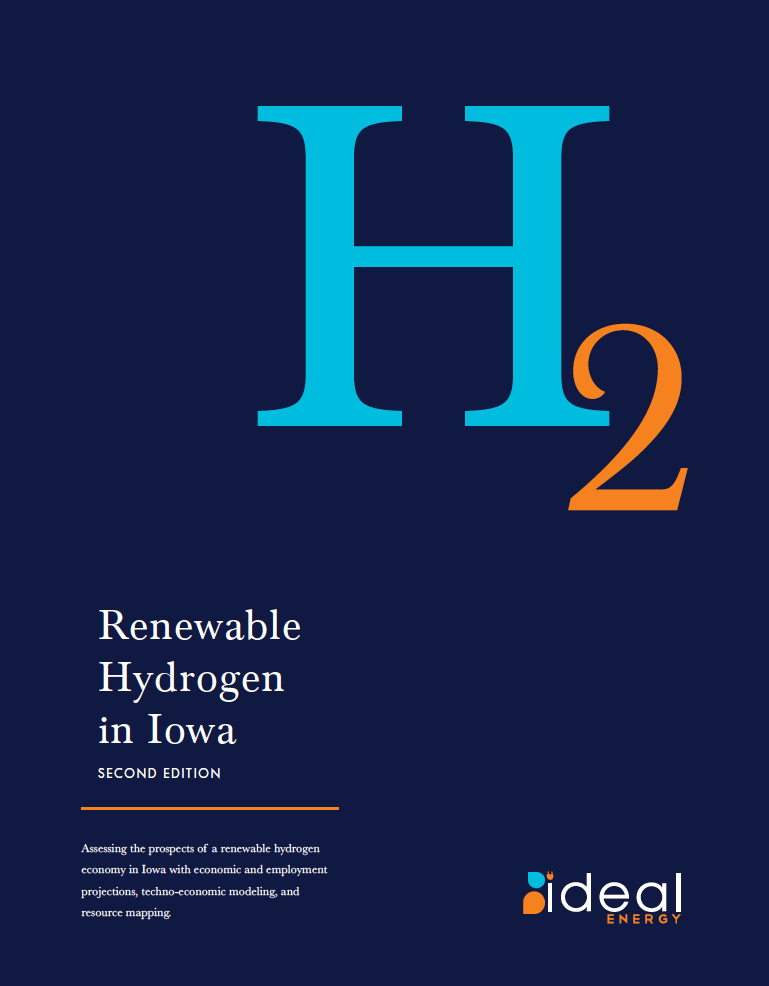Renewable Hydrogen
Unlocking opportunity to produce clean & affordable hydrogen
Ideal Energy is at the forefront of the renewable hydrogen economy in Iowa. We are laying the foundation for industrial-scale renewable hydrogen production. We believe Iowa is in a unique position to lead the way.
We are actively developing a new value chain that will bring the state’s resources and infrastructure together to build a resilient and robust energy future.
Renewable Hydrogen in Iowa
With funding from the Iowa Economic Development Authority, and the U.S. Department of Energy, we undertook an in-depth research project to study the potential opportunity of renewable hydrogen in Iowa.
Our white paper provides an in-depth assessment of the prospects of a renewable hydrogen economy in Iowa with economic and employment projections, techno-economic modeling, and resource mapping.
Pilot Projects
Creating Renewable Hydrogen
STAGE
1
WIND & SOLAR POWER
Excess power can provide clean electricity for electrolysis
STAGE
2
ELECTROLYSIS
Electrolyzers use electricity to convert water (H20) into hydrogen (H2) and oxygen (O2)
STAGE
3
RENEWABLE HYDROGEN
H2 can be used onsite for energy storage or shipped elsewhere for other uses
Applications
ENERGY STORAGE
AMMONIA
FUEL CELLS
NATURAL GAS GRID
Hydrogen Services
We have been developing clean electricity projects for over a decade with our solar installations and battery-energy storage systems. Now, we are also working on carbon-free chemical energy.
Renewable hydrogen (H2) is perfectly suited to all of the situations renewable electricity and batteries are not, from longer-term energy storage to agrichemical uses to heavy transport. We think the growth potential for the renewable hydrogen industry is hard to overstate, and we are proud to be on the leading edge.
Resource Mapping
We inventoried Iowa’s wind energy assets, solar photovoltaic (PV) resources, and potential hydrogen off-takers. With abundant wind energy resources and a huge demand for ammonia – which is a hydrogen product – Iowa is the ideal place to begin growing America’s hydrogen economy
- Iowa generates 57.51% of its energy with wind – the highest percentage of any state in the nation – and is second only to Texas in total installed capacity with 11,660 megawatts.
- The technical solar potential of Iowa ranks 16th in the nation, ahead of Florida and the Carolinas.
- Iowa is home to several agrichemical companies that produce nitrogen fertilizers from ammonia, including CF Industries and Iowa Fertilizer Company.
- The NuStar ammonia pipeline carries upwards of 30,000 barrels of ammonia per day to facilities in Iowa and neighboring states.
Infrastructure
Renewable hydrogen production requires a renewable energy source, an electrolyzer, and hydrogen storage and transport infrastructure. Wind and solar PV farms provide the perfect energy source. Wind farms have high capacity factors while solar farms provide the lowest cost of electricity during the daytime. Competitively priced renewable H2 will require both low-cost renewable electricity and a high electrolyzer capacity factor.
The petroleum refining and chemical processing industries have decades of experience with hydrogen purification, storage, and transportation, as well as safe handling practices. Iowa is home to several chemical facilities involved in ammonia and ammonia product production, storage, and transshipment.
Electrolyzers are the key pieces of infrastructure that are still evolving. Current options include alkaline water electrolyzers, proton exchange membrane (PEM) electrolyzers, solid oxide electrolyzer cells (SOECs).
Pricing Models
Iowa has some of the lowest cost wind energy in the nation. Typical wholesale wind energy prices are $15/MWh and average power purchasing agreement (PPA) wind prices are $11/MWh.
In addition, Iowa has high rates of curtailment. Curtailed power is power that could have been generated, but was not due to insufficient demand, grid congestion, or other factors. Curtailed power can be used for renewable hydrogen production, which would drive prices even lower.
Potential Markets
We have identified three key early-stage markets with great promise: ammonia production, natural gas blending, and transit bus fleets. As experience with renewable hydrogen increases in Iowa and the cost of CO2 emissions becomes increasingly important in investment decisions, other use cases will emerge.
Hydrogen is in widespread use today as the principle feedstock of ammonia. The global ammonia market is valued at nearly $75 billion. Renewable hydrogen can be easily substituted into this market. With approximately 23.6 million acres planted – more than any other state – demand for ammonia-based nitrogen fertilizers in Iowa exceeds 1.5 million tons per year.
Renewable hydrogen may be used to fuel medium and heavy-duty trucks, freight rail, and oceanic transport. Hydrogen is a necessary ingredient in carbon-free fuels like renewable diesel, sustainable aviation fuel (SAF), and hydrotreated vegetable oil (HVO). Hydrogen has applications in heavy industry, including steelmaking. It is even possible to convert some type of coal power plants to burn hydrogen or ammonia.

